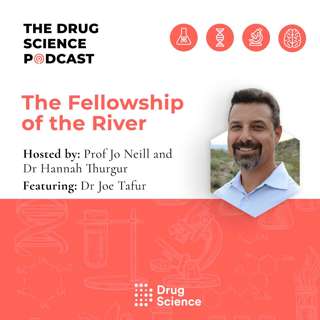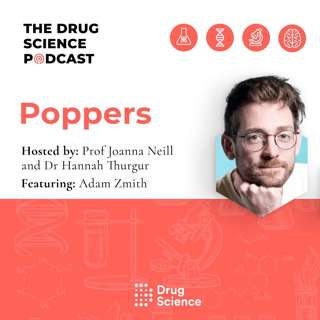
139. Poppers with Adam Zmith
In this episode, we speak with Adam Zmith, podcast producer, writer, and author of Deep Sniff: A History of Poppers and Queer Futures. He describes his motivation behind writing the book, all before diving into the complex history of poppers. By speaking to the policing and regulation of poppers, Zmith explores broader struggles between the queer community and the government, in addition to the necessity for greater harm reduction for poppers. Despite these struggles, he underscores the ways in which queer culture has been shaped by poppers and how, in return, poppers have been shaped by queer culture. Links● Adam Zmith● Deep Sniff● Poppers● The Log Books● Switchboard● Sir Thomas Lauder Brunton● UK Man Consumes Poppers Accidentally ★ Support this podcast ★
29 Okt 47min
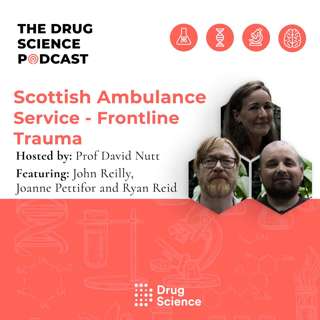
138. Scottish Ambulance Service - Frontline Trauma with John, Joanne and Ryan
Join us in this episode as Prof Nutt speaks to John, Joanne, and Ryan of the Scottish Ambulance Service in Glasgow. They explore their backgrounds in the Service and how their work exposed them to challenging situations that caused severe detriment to their mental health. After describing the failings of traditional mental health support for emergency workers, they tell their story of travelling to Peru for an ayahuasca retreat, an eye-opening and profoundly heartening experience. LinksScottish Ambulance ServicesAyahuascaHeroic Hearts Project UKThe ShipiboScottish Psychedelic Research Group ★ Support this podcast ★
16 Okt 53min

137. Cultural History of the Magic Mushroom with Dr Andy Letcher
In this episode of the Drug Science podcast, we speak to Dr Andy Letcher, a religious scholar and author of the book Shroom: the Cultural History of the Magic Mushroom. He explores his complimentary background in science and the humanities, depicting how this combination structured his thinking. Noting the religious potential of psychedelic experiences, Letcher links the spiritual with the psychedelic, explaining what he sought to capture in his book and where it has gone since. Finally, he discusses how his interest in transdisciplinary perspectives on psychedelics has coalesced in the University of Exeter’s psychedelic postgraduate courses. PSYCH SYMPOSIUM 2025 LinksShroom: A Cultural History of the Magic MushroomPsychedelics: Mind, Medicine, and CulturePsilocybinSeeking the Magic Mushroom by R. Gordon WassonPsychedelia Britannia: Druids on Drugs ★ Support this podcast ★
2 Okt 43min
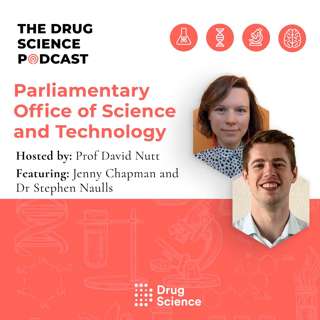
136. Parliamentary Office of Science and Technology with Jenny Chapman and Dr Stephen Naulls
Tune into the latest episode of the Drug Science Podcast, where we talk to Jenny Chapman and Dr. Stephen Naulls, researchers at the Parliamentary Office of Science and Technology (POST) and authors of ‘Psychedelic-assisted therapy for mental health: Policy considerations, a briefing for Parliament’ on the state of psychedelic research. They explore the remit of POST in highlighting objective, emerging scientific research, and how psychedelics have come into their focus. With backgrounds in biology and medicine, both Jenny and Stephen stress the interwoven nature of science and policy. Through this intersection, they highlight the policy levers holding psychedelic researchers back and what Parliament and the greater public can take from the POST brief. Links Parliamentary Office of Science and Technology POST report on Psychedelic-assisted therapy for mental health: Policy considerations, a briefing for Parliament Psychedelic drugs to treat eating disorders Psychedelic drugs to treat post-traumatic stress disorder (PTSD) Psychedelic-assisted therapy to treat anxiety disorders Psychedelic drugs to treat depression Psychedelic-assisted therapy in the treatment of addiction POST Board Fellowship opportunities POST All Reports Knowledge Exchange Unit – KEU Horizon Scanning Ketamine ★ Support this podcast ★
17 Sep 47min
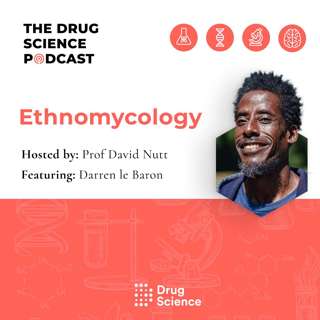
135. Ethnomycology with Darren Le Baron
In this episode of the Drug Science Podcast, we speak with Darren Le Baron, an accomplished mycologist and educator. He discusses how his hardships from his upbringing in East London have informed his current work, where he uses horticulture to connect with children at risk of being drawn into crime. He transitions to explore his series Psychedelics in Africa, explaining some of the many links between psychedelics and African culture, both in ancient times and modernity. Throughout, he emphasises the importance of African perspectives and similar indigenous ones, challenging their absence in mainstream psychedelic discourse. LinksDarren Le BaronWho is Darren Le BaronDarren's Instagram We Are Grow Mushrooms Psilocybin About Kilindi Iyi Psychedelics in Africa: The Untold Story Ibogaine ★ Support this podcast ★
3 Sep 45min
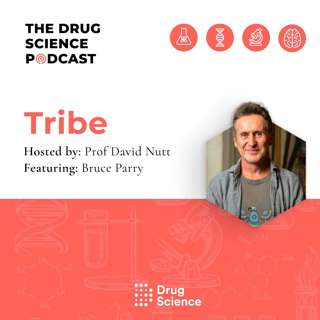
134. Tribe with Bruce Parry
Join us in this episode as we speak to Bruce Parry, the creator and star of the BBC series Tribe With Bruce Parry. He explains his sharp career change from a Royal Marine to an advocate for indigenous rights, where he’s developed a humble approach to learning from indigenous tribes, defined by listening and witnessing. He talks about his experiences of psychedelics in these contexts, namely ayahuasca, which have vastly shaped his outlook on life. Through this lens, he lends his opinions on topics like ayahuasca tourism and capitalist culture in the psychedelic space.Tribe with Bruce Parry Psilocybin Ayahuasca ★ Support this podcast ★
20 Aug 42min

133. Psychedelic Ethics with Dr Edward Jacobs and Sam Bloomfield
In this episode of the Drug Science Podcast, we speak with Sam Bloomfield, founder of PsyEdu, and Dr. Eddie Jacobs, the first person to complete a doctorate in psychedelic ethics. Drawing on their backgrounds in education and ethics, they explore why these perspectives are essential to the evolving field of psychedelics. They also discuss the role of trials, clinics, and retreats within the broader psychedelic ecosystem, highlighting a major blind spot: the vast majority of psychedelic experiences occur outside of these settings. The conversation additionally examines how understandings of medicine often must adapt to the unique nature of psychedelics. Throughout, they underscore the importance of education in driving long-term policy change that ensures safer, more equitable, and more ethical psychedelic access.Psychedelic Training in the UKPsyEdu Beckley FoundationPsychedelic Ethics Psilocybin MDMA MAPS Public Attitudes to Psilocybin-Assisted Therapy HOPE Statement ★ Support this podcast ★
6 Aug 53min
